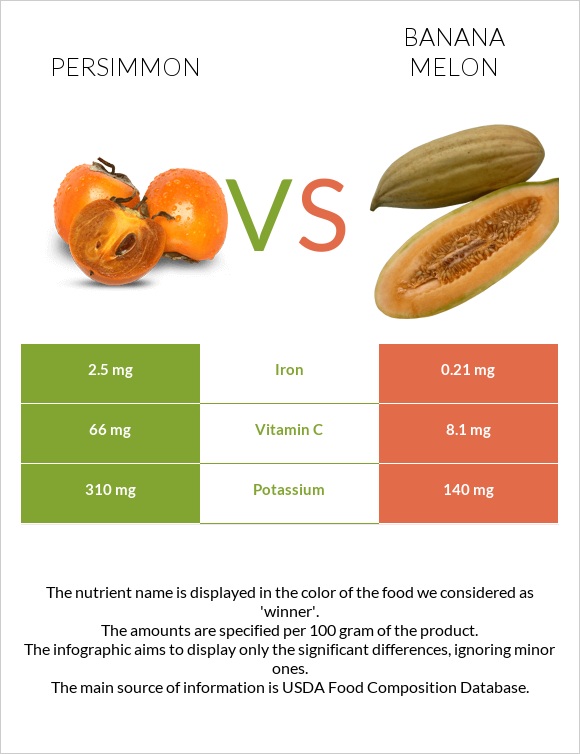Persimmon vs. Banana melon — In-Depth Nutrition Comparison
Compare
What are the differences between persimmon and banana melon?
- Persimmon is richer than banana melon in vitamin C and iron.
- Persimmon's daily need coverage for vitamin C is 64% more.
- Persimmon has 12 times more iron than banana melon. While persimmon has 2.5mg of iron, banana melon has only 0.21mg.
We used Persimmons, native, raw and Melon, banana (Navajo) types in this article.
Infographic

Infographic link
Mineral Comparison
Mineral comparison score is based on the number of minerals by which one or the other food is richer. The "coverage" charts below show how much of the daily needs can be covered by 300 grams of the food.
| Contains more CalciumCalcium | +107.7% |
| Contains more PotassiumPotassium | +121.4% |
| Contains more IronIron | +1090.5% |
| Contains more PhosphorusPhosphorus | +188.9% |
| Contains less SodiumSodium | -90.9% |
Vitamin Comparison
Vitamin comparison score is based on the number of vitamins by which one or the other food is richer. The "coverage" charts below show how much of the daily needs can be covered by 300 grams of the food.
| Contains more Vitamin CVitamin C | +714.8% |
All nutrients comparison - raw data values
| Nutrient |  |
 |
DV% diff. |
| Vitamin C | 66mg | 8.1mg | 64% |
| Iron | 2.5mg | 0.21mg | 29% |
| Carbs | 33.5g | 4.06g | 10% |
| Calories | 127kcal | 21kcal | 5% |
| Potassium | 310mg | 140mg | 5% |
| Folate | 20µg | 5% | |
| Copper | 0.035mg | 4% | |
| Vitamin B6 | 0.05mg | 4% | |
| Vitamin K | 4.9µg | 4% | |
| Vitamin B3 | 0.46mg | 3% | |
| Fructose | 2.06g | 3% | |
| Magnesium | 10mg | 2% | |
| Phosphorus | 26mg | 9mg | 2% |
| Manganese | 0.036mg | 2% | |
| Vitamin B1 | 0.02mg | 2% | |
| Calcium | 27mg | 13mg | 1% |
| Fiber | 0.3g | 1% | |
| Zinc | 0.14mg | 1% | |
| Selenium | 0.4µg | 1% | |
| Vitamin B2 | 0.018mg | 1% | |
| Vitamin B5 | 0.07mg | 1% | |
| Protein | 0.8g | 0.84g | 0% |
| Fats | 0.4g | 0.2g | 0% |
| Net carbs | 33.5g | 3.76g | N/A |
| Sugar | 3.36g | N/A | |
| Sodium | 1mg | 11mg | 0% |
| Tryptophan | 0.014mg | 0% | |
| Threonine | 0.041mg | 0% | |
| Isoleucine | 0.035mg | 0% | |
| Leucine | 0.058mg | 0% | |
| Lysine | 0.045mg | 0% | |
| Methionine | 0.007mg | 0% | |
| Phenylalanine | 0.036mg | 0% | |
| Valine | 0.042mg | 0% | |
| Histidine | 0.016mg | 0% |
Macronutrient Comparison
Macronutrient breakdown side-by-side comparison
Protein:
0.8 g
Fats:
0.4 g
Carbs:
33.5 g
Water:
64.4 g
Other:
0.9 g
Protein:
0.84 g
Fats:
0.2 g
Carbs:
4.06 g
Water:
94.66 g
Other:
0.24 g
| Contains more FatsFats | +100% |
| Contains more CarbsCarbs | +725.1% |
| Contains more OtherOther | +275% |
| Contains more WaterWater | +47% |
~equal in
Protein
~0.84g





